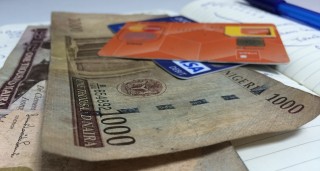What is a recession?
Technically, a recession is defined by two consecutive quarters of negative growth as measured by a country’s Gross Domestic Product (GDP). The GDP basically measures the total value of goods and services produced in the country.
In less technical terms, a recession is a significant decline in activities across the economy, lasting longer than a few months. The decline is visible in industrial production, employment, real income and wholesale-retail trade, according to Investopedia.
Err … In the words of Abraham Attah: I am not understanding. Can you please break it down?
Okay. A recession is a lot more than just official figures and metrics, and has real impacts on the lives of citizens in a country. People lose their jobs, businesses shut down, people are unable to meet up with payment obligations and so they lose their homes. Some people suddenly find themselves below the poverty line, and, in some cases, find it difficult to get three triangle meals a day (I never get that square meal thing. I mean its three, so triangle is more like it), banks refuse to give out loans, the flow of money becomes restricted, the list goes on.
Simply put, a lot of unpleasant things happen during a recession. It also usually brings with it, social unrest. And ironically, governments may restrict spending and increase taxation during this period, thereby amplifying the effects of the recession. This was the case in Nigeria in the 1980s and more recently in Greece, in the aftermath of the 2007 global recession.
Nigeria in 1980? Why are we talking about something that happened over three decades ago?
Because it’s happening again. It is happening NOW. Last month, Nigeria’s Finance Minister, Kemi Adeosun, stated the obvious when she said Nigeria was “technically in a recession” as Nigerians awaited the long overdue official GDP figures. Not only had inflation and unemployment risen for at least 7 consecutive months to disturbing levels but, the period also saw the greatest number attacks on oil facilities. Seeing as oil revenue contributes 70 percent of the country’s revenue and 90 percent of export earnings this was kind of a big problem. The problem was compounded by the fact that the Naira (the country’s local currency) had fallen by 40 percent since the removal of the currency peg in June to attract more investments. The persistent fall in commodity prices since mid 2014 also affected the country adversely. And the use of outdated policies by the Federal Government and the incessant attacks on critical oil infrastructure in the country, have dissuaded investors and made a recession all but inevitable.
Oh! I see …
Glad you do.
But from all you’ve said, the country has been in a recession, and Nigerians have OBVIOUSLY been feeling the heat. So why is this suddenly a big deal today?
Kindly refer to the last paragraph, and then refer to my title. Yeah, that’s why its news; it was finally declared that the country’s economy is sinking. And the announcement came without any colouring, embellishment, or high sounding vocabulary like “technically.” Today, the National Bureau of Statistics made Nigeria’s second quarter GDP figures public and it showed that in the last three months economic activity fell by 2.06 percent from negative growth of 0.3 in the first quarter of the year. The extent of the negative growth is alarming by any standard, but while the magnitude of the fall is huge, no one who vaguely follows the economic situation of Africa’s biggest economy (until last month) can say they didn’t see this coming. The official announcement of second quarter figures is of little consequence to the average Nigerian on the street, as the realities on the ground reflected the depth of the GDP fall.
Okay, so the recession was easily foreseeable. But the magnitude shows that the economy is doing worse than was feared.
You’re catching on now. As this was anticipated by everyone including the Nigerian government, measures had been put in place to reverse the situation. For example, the federal government announced that it was going to allocate over a N100 billion extra in capital spending for the year. Over 80 billion Dollars of Chinese investments have been secured in the petroleum sector, and the quarterly results show that locally produced goods have risen in response to targeted government efforts. However, in light of the Q2 results the government may feel that they have to scale up their measures in response to the crisis.








